Words from other parts of the world
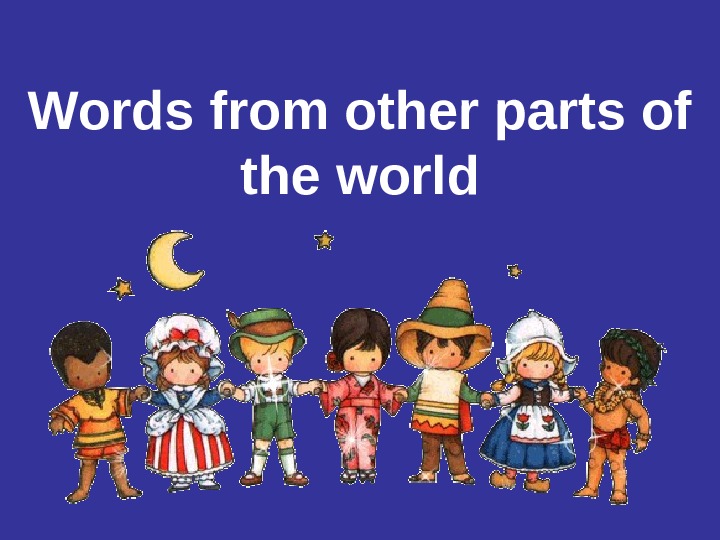

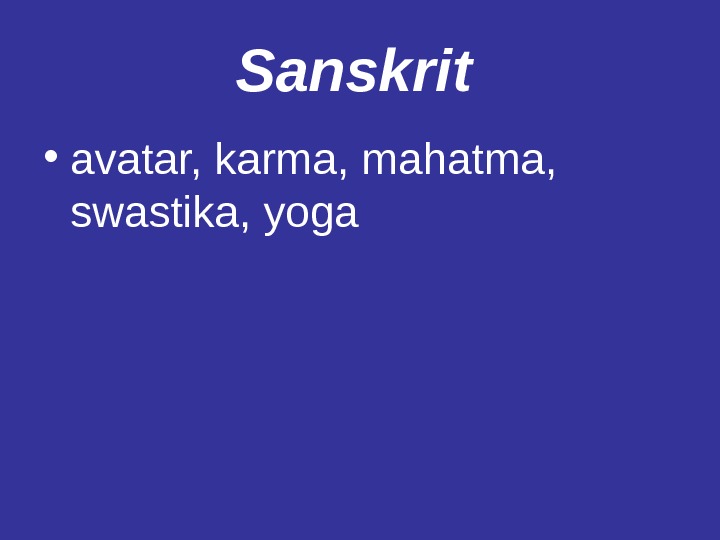
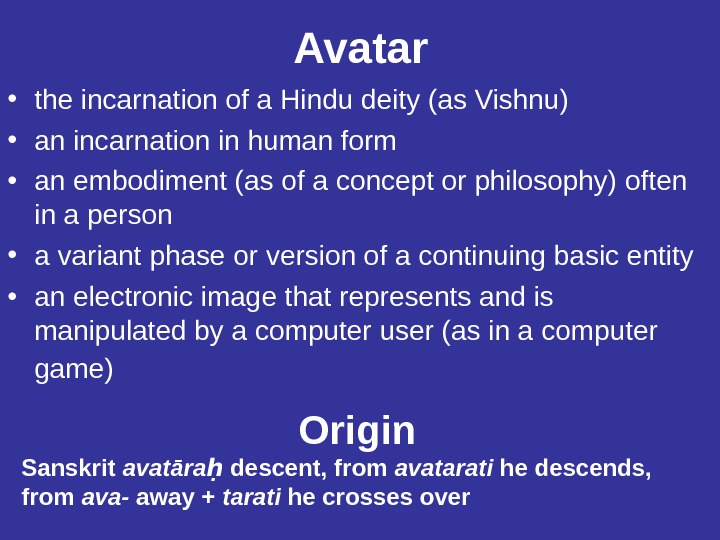

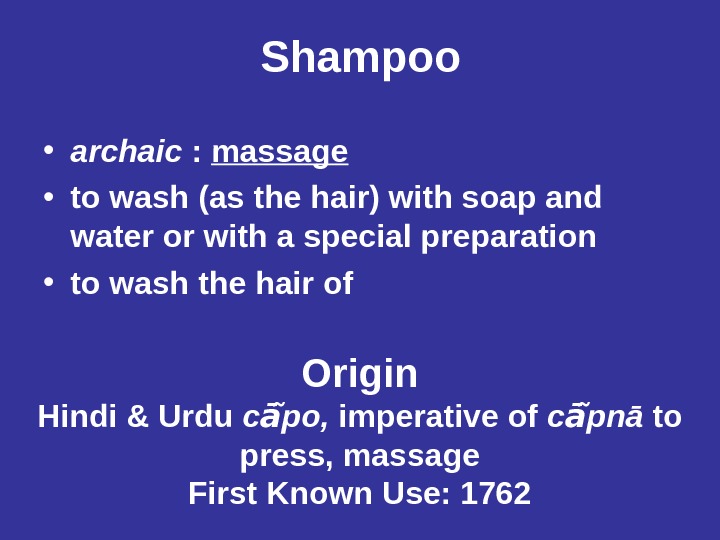
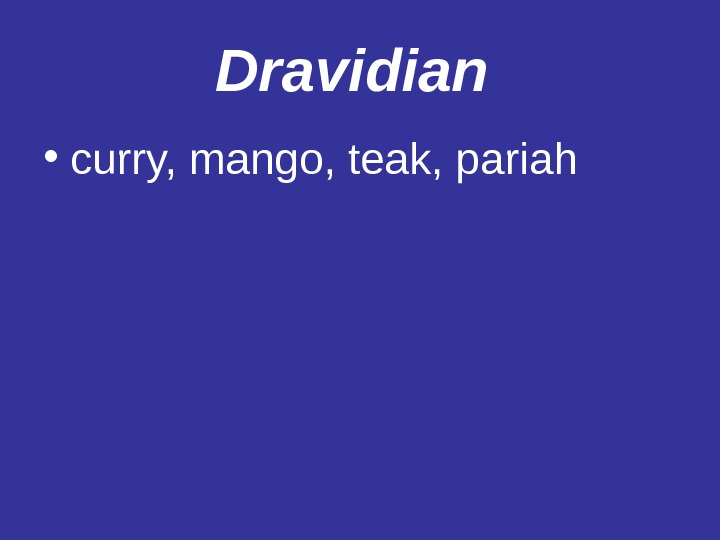
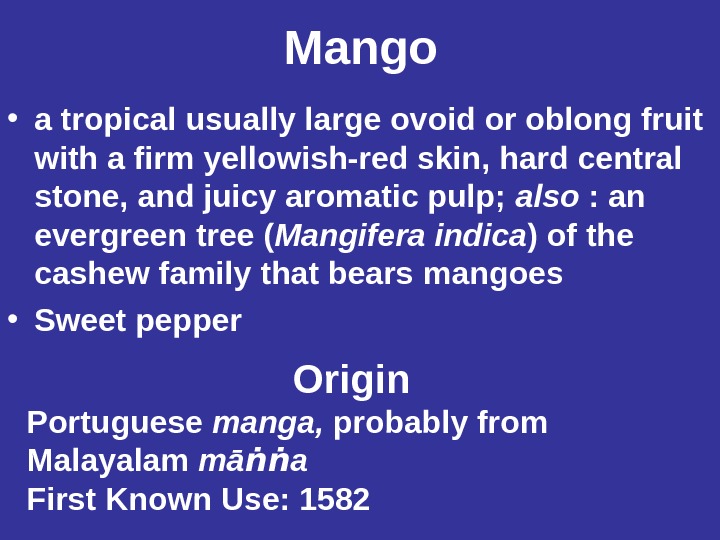
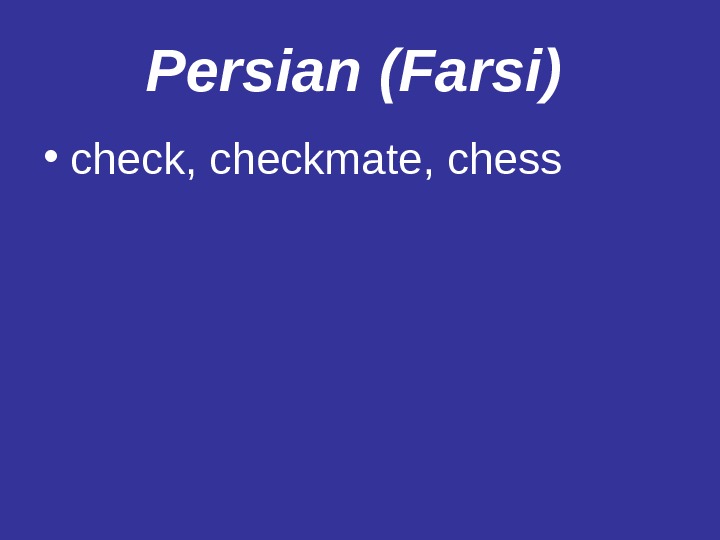


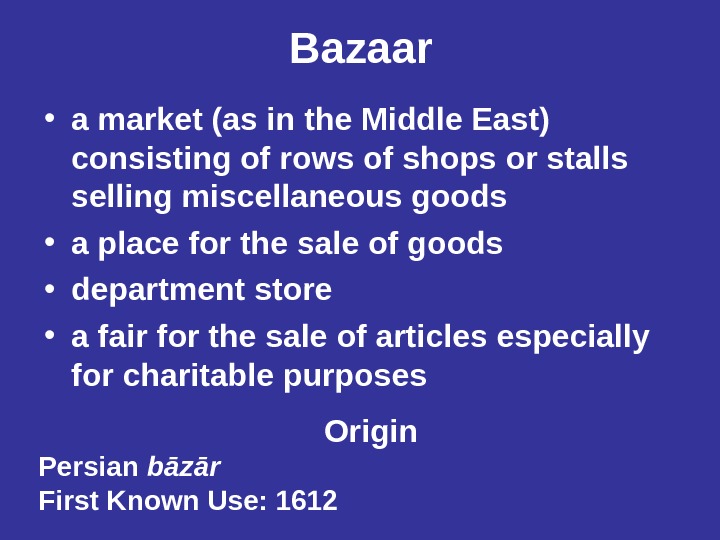
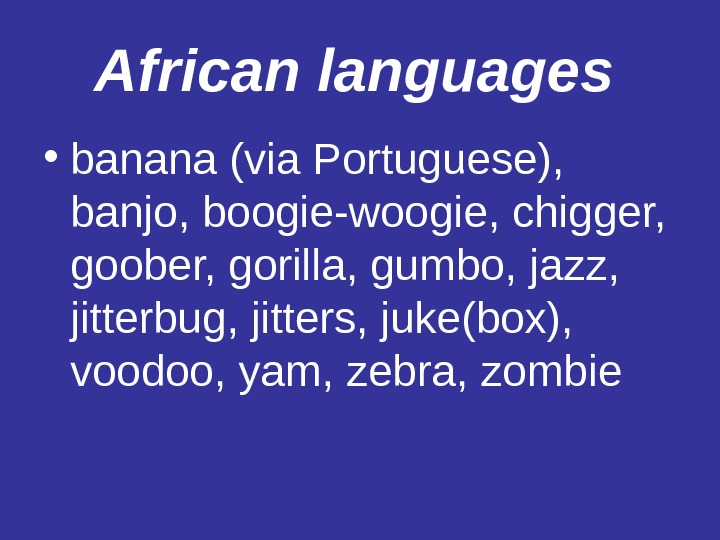
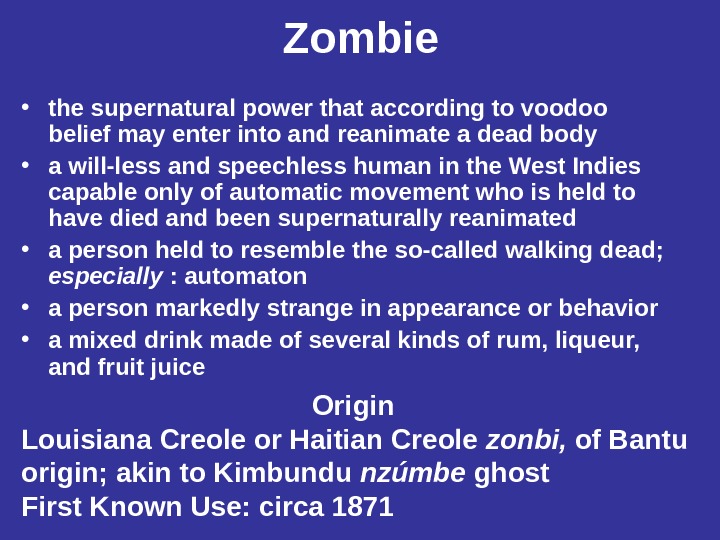
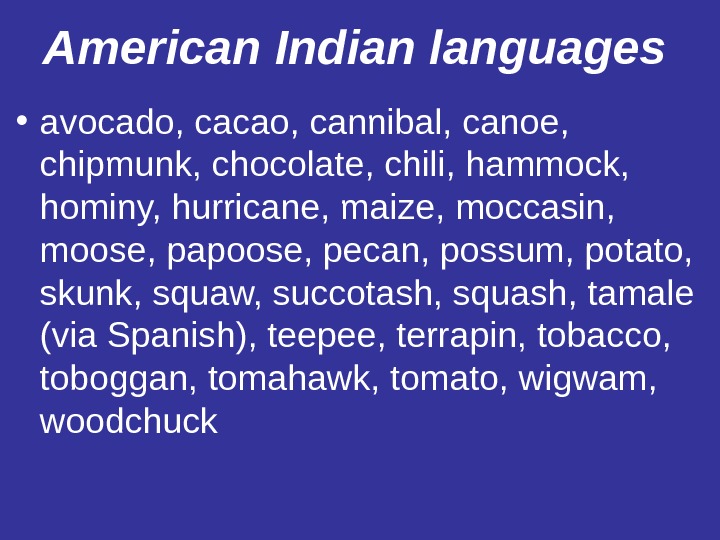

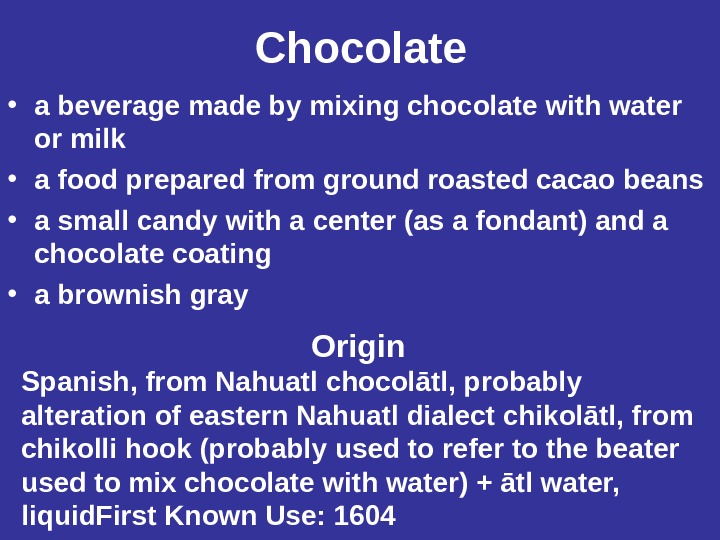
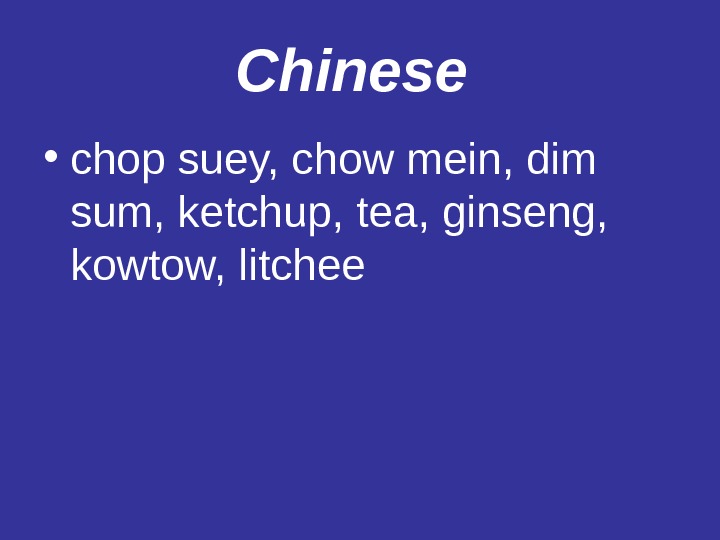

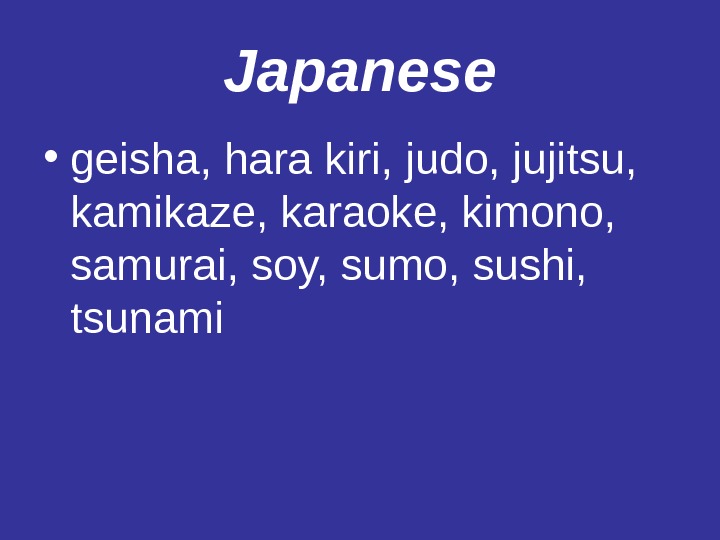
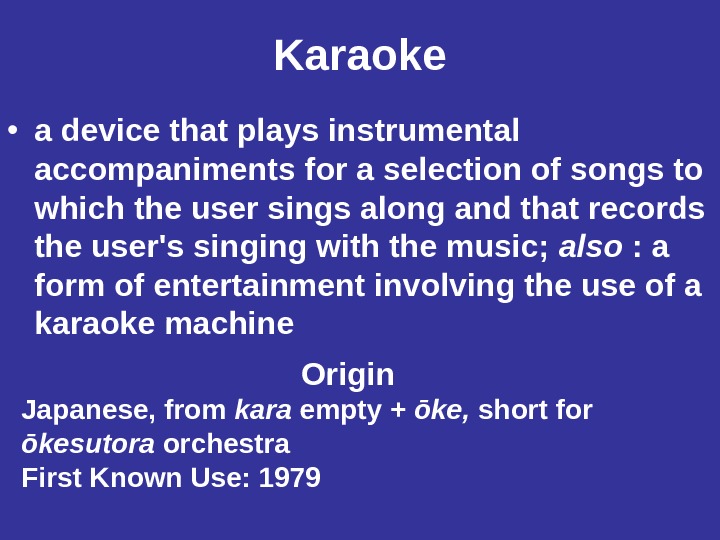
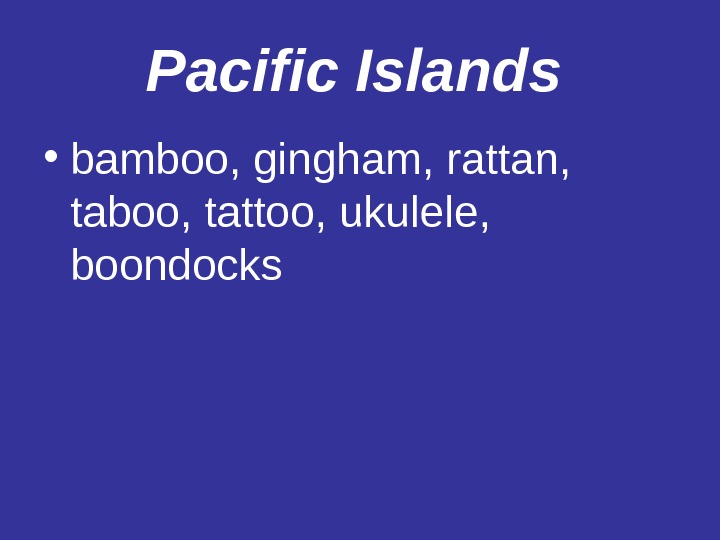
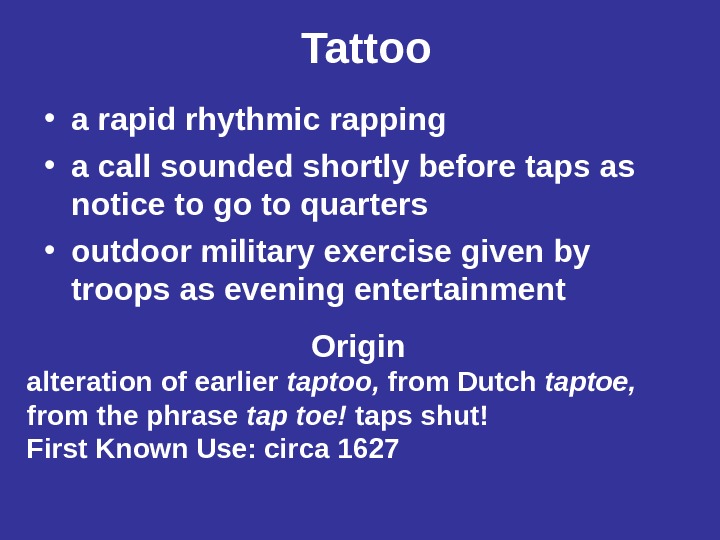

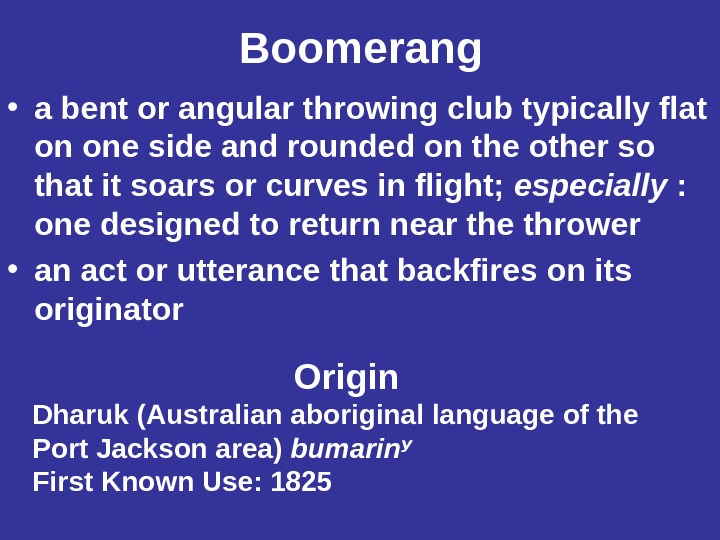
- Размер: 245 Кб
- Количество слайдов: 25
Описание презентации Words from other parts of the world по слайдам
 Words from other parts of the world
Words from other parts of the world
 17 -19 centuries — British imperialism. Borrowings from languages around the world. Development of American English. By 19 th century, a standard variety of American English develops, based on the dialect of the Mid-Atlantic states. Establishment of English in Australia, South Africa, and India, among other British colonial outposts.
17 -19 centuries — British imperialism. Borrowings from languages around the world. Development of American English. By 19 th century, a standard variety of American English develops, based on the dialect of the Mid-Atlantic states. Establishment of English in Australia, South Africa, and India, among other British colonial outposts.
 Sanskrit • avatar, karma, mahatma, swastika, yoga
Sanskrit • avatar, karma, mahatma, swastika, yoga
 Avatar • the incarnation of a Hindu deity (as Vishnu) • an incarnation in human form • an embodiment (as of a concept or philosophy) often in a person • a variant phase or version of a continuing basic entity • an electronic image that represents and is manipulated by a computer user (as in a computer game) Origin Sanskrit avatārah descent, from avatarati he descends, from ava- away + tarati he crosses over
Avatar • the incarnation of a Hindu deity (as Vishnu) • an incarnation in human form • an embodiment (as of a concept or philosophy) often in a person • a variant phase or version of a continuing basic entity • an electronic image that represents and is manipulated by a computer user (as in a computer game) Origin Sanskrit avatārah descent, from avatarati he descends, from ava- away + tarati he crosses over
 Hindi • bandanna, bangle, bungalow, chintz, cot, cummerbund, dungaree, juggernaut, jungle, loot, maharaja, nabob, pajamas, punch (the drink), shampoo, thug, kedgeree, jamboree
Hindi • bandanna, bangle, bungalow, chintz, cot, cummerbund, dungaree, juggernaut, jungle, loot, maharaja, nabob, pajamas, punch (the drink), shampoo, thug, kedgeree, jamboree
 Shampoo • archaic : massage • to wash (as the hair) with soap and water or with a special preparation • to wash the hair of Origin Hindi & Urdu c po, āā imperative of c pnāāā to press, massage First Known Use:
Shampoo • archaic : massage • to wash (as the hair) with soap and water or with a special preparation • to wash the hair of Origin Hindi & Urdu c po, āā imperative of c pnāāā to press, massage First Known Use:
 Dravidian • curry, mango, teak, pariah
Dravidian • curry, mango, teak, pariah
 Mango • a tropical usually large ovoid or oblong fruit with a firm yellowish-red skin, hard central stone, and juicy aromatic pulp; also : an evergreen tree ( Mangifera indica ) of the cashew family that bears mangoes • Sweet pepper Origin Portuguese manga, probably from Malayalam mā ann First Known Use:
Mango • a tropical usually large ovoid or oblong fruit with a firm yellowish-red skin, hard central stone, and juicy aromatic pulp; also : an evergreen tree ( Mangifera indica ) of the cashew family that bears mangoes • Sweet pepper Origin Portuguese manga, probably from Malayalam mā ann First Known Use:
 Persian (Farsi) • check, checkmate, chess
Persian (Farsi) • check, checkmate, chess
 Chess • a game for 2 players each of whom moves 16 pieces according to fixed rules across a checkerboard and tries to checkmate the opponent’s king Origin Middle English ches, from Anglo-French escheks, eschés, plural of escheck at chess First Known Use: 14 th century
Chess • a game for 2 players each of whom moves 16 pieces according to fixed rules across a checkerboard and tries to checkmate the opponent’s king Origin Middle English ches, from Anglo-French escheks, eschés, plural of escheck at chess First Known Use: 14 th century
 Arabic • bedouin, emir, jakir, gazelle, giraffe, harem, hashish, lute, minaret, mosque, myrrh, salaam, sirocco, sultan, vizier, bazaar, caravan
Arabic • bedouin, emir, jakir, gazelle, giraffe, harem, hashish, lute, minaret, mosque, myrrh, salaam, sirocco, sultan, vizier, bazaar, caravan
 Bazaar • a market (as in the Middle East) consisting of rows of shops or stalls selling miscellaneous goods • a place for the sale of goods • department store • a fair for the sale of articles especially for charitable purposes Origin Persian bāzār First Known Use:
Bazaar • a market (as in the Middle East) consisting of rows of shops or stalls selling miscellaneous goods • a place for the sale of goods • department store • a fair for the sale of articles especially for charitable purposes Origin Persian bāzār First Known Use:
 African languages • banana (via Portuguese), banjo, boogie-woogie, chigger, goober, gorilla, gumbo, jazz, jitterbug, jitters, juke(box), voodoo, yam, zebra, zombie
African languages • banana (via Portuguese), banjo, boogie-woogie, chigger, goober, gorilla, gumbo, jazz, jitterbug, jitters, juke(box), voodoo, yam, zebra, zombie
 Zombie • the supernatural power that according to voodoo belief may enter into and reanimate a dead body • a will-less and speechless human in the West Indies capable only of automatic movement who is held to have died and been supernaturally reanimated • a person held to resemble the so-called walking dead; especially : automaton • a person markedly strange in appearance or behavior • a mixed drink made of several kinds of rum, liqueur, and fruit juice Origin Louisiana Creole or Haitian Creole zonbi, of Bantu origin; akin to Kimbundu nzúmbe ghost First Known Use: circa
Zombie • the supernatural power that according to voodoo belief may enter into and reanimate a dead body • a will-less and speechless human in the West Indies capable only of automatic movement who is held to have died and been supernaturally reanimated • a person held to resemble the so-called walking dead; especially : automaton • a person markedly strange in appearance or behavior • a mixed drink made of several kinds of rum, liqueur, and fruit juice Origin Louisiana Creole or Haitian Creole zonbi, of Bantu origin; akin to Kimbundu nzúmbe ghost First Known Use: circa
 American Indian languages • avocado, cacao, cannibal, canoe, chipmunk, chocolate, chili, hammock, hominy, hurricane, maize, moccasin, moose, papoose, pecan, possum, potato, skunk, squaw, succotash, squash, tamale (via Spanish), teepee, terrapin, tobacco, toboggan, tomahawk, tomato, wigwam, woodchuck
American Indian languages • avocado, cacao, cannibal, canoe, chipmunk, chocolate, chili, hammock, hominy, hurricane, maize, moccasin, moose, papoose, pecan, possum, potato, skunk, squaw, succotash, squash, tamale (via Spanish), teepee, terrapin, tobacco, toboggan, tomahawk, tomato, wigwam, woodchuck
 • (plus thousands of place names, including Ottawa, Toronto, Saskatchewan and the names of more than half the states of the U. S. , including Michigan, Texas, Nebraska, Illinois)
• (plus thousands of place names, including Ottawa, Toronto, Saskatchewan and the names of more than half the states of the U. S. , including Michigan, Texas, Nebraska, Illinois)
 Chocolate • a beverage made by mixing chocolate with water or milk • a food prepared from ground roasted cacao beans • a small candy with a center (as a fondant) and a chocolate coating • a brownish gray Origin Spanish, from Nahuatl chocolātl, probably alteration of eastern Nahuatl dialect chikolātl, from chikolli hook (probably used to refer to the beater used to mix chocolate with water) + ātl water, liquid. First Known Use:
Chocolate • a beverage made by mixing chocolate with water or milk • a food prepared from ground roasted cacao beans • a small candy with a center (as a fondant) and a chocolate coating • a brownish gray Origin Spanish, from Nahuatl chocolātl, probably alteration of eastern Nahuatl dialect chikolātl, from chikolli hook (probably used to refer to the beater used to mix chocolate with water) + ātl water, liquid. First Known Use:
 Chinese • chop suey, chow mein, dim sum, ketchup, tea, ginseng, kowtow, litchee
Chinese • chop suey, chow mein, dim sum, ketchup, tea, ginseng, kowtow, litchee
 Ketchup • a seasoned pureed condiment usually made from tomatoes Origin Malay kĕchap fish sauce First Known Use: circa
Ketchup • a seasoned pureed condiment usually made from tomatoes Origin Malay kĕchap fish sauce First Known Use: circa
 Japanese • geisha, hara kiri, judo, jujitsu, kamikaze, karaoke, kimono, samurai, soy, sumo, sushi, tsunami
Japanese • geisha, hara kiri, judo, jujitsu, kamikaze, karaoke, kimono, samurai, soy, sumo, sushi, tsunami
 Karaoke • a device that plays instrumental accompaniments for a selection of songs to which the user sings along and that records the user’s singing with the music; also : a form of entertainment involving the use of a karaoke machine Origin Japanese, from kara empty + ōke, short for ōkesutora orchestra First Known Use:
Karaoke • a device that plays instrumental accompaniments for a selection of songs to which the user sings along and that records the user’s singing with the music; also : a form of entertainment involving the use of a karaoke machine Origin Japanese, from kara empty + ōke, short for ōkesutora orchestra First Known Use:
 Pacific Islands • bamboo, gingham, rattan, taboo, tattoo, ukulele, boondocks
Pacific Islands • bamboo, gingham, rattan, taboo, tattoo, ukulele, boondocks
 Tattoo • a rapid rhythmic rapping • a call sounded shortly before taps as notice to go to quarters • outdoor military exercise given by troops as evening entertainment Origin alteration of earlier taptoo, from Dutch taptoe, from the phrase tap toe! taps shut! First Known Use: circa
Tattoo • a rapid rhythmic rapping • a call sounded shortly before taps as notice to go to quarters • outdoor military exercise given by troops as evening entertainment Origin alteration of earlier taptoo, from Dutch taptoe, from the phrase tap toe! taps shut! First Known Use: circa
 Australia • boomerang, budgerigar, didgeridoo, kangaroo (and many more in Australian English)
Australia • boomerang, budgerigar, didgeridoo, kangaroo (and many more in Australian English)
 Boomerang • a bent or angular throwing club typically flat on one side and rounded on the other so that it soars or curves in flight; especially : one designed to return near the thrower • an act or utterance that backfires on its originator Origin Dharuk (Australian aboriginal language of the Port Jackson area) bumarinʸ First Known Use:
Boomerang • a bent or angular throwing club typically flat on one side and rounded on the other so that it soars or curves in flight; especially : one designed to return near the thrower • an act or utterance that backfires on its originator Origin Dharuk (Australian aboriginal language of the Port Jackson area) bumarinʸ First Known Use:
